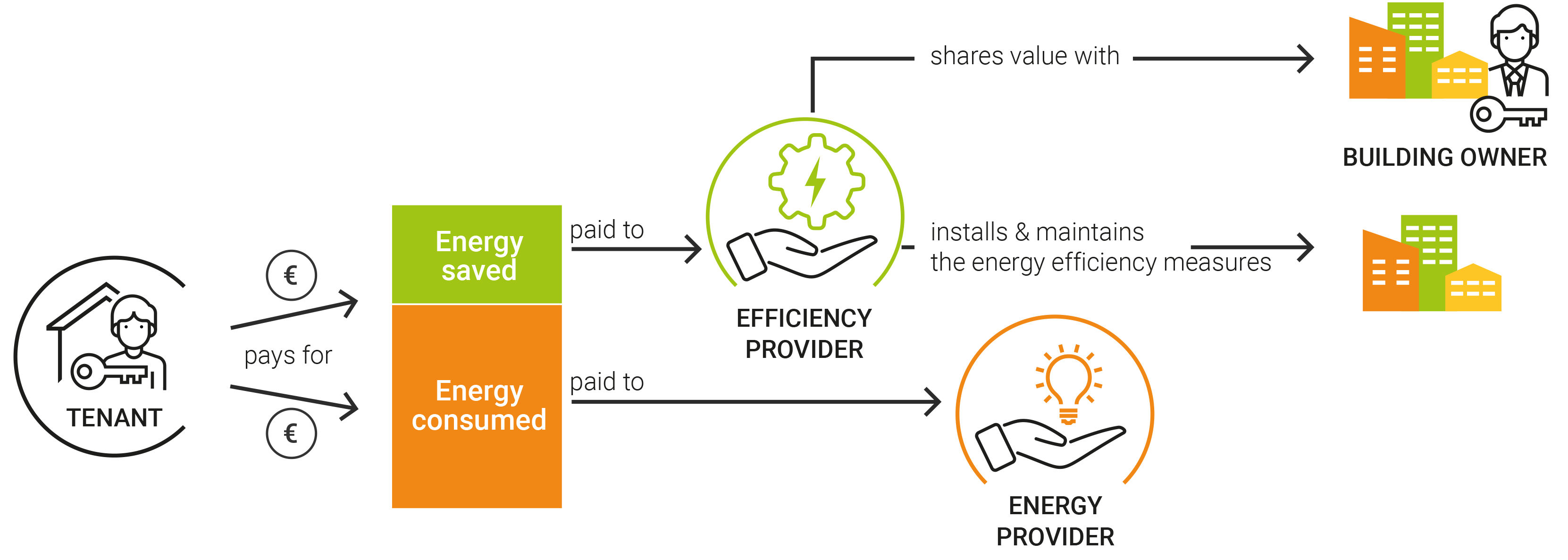Commercial rented sector
In Europe, buildings account for 40% of energy consumption and 36% of the generated carbon emissions. According to latest research studies, 75% of all buildings in the European Union are energy inefficient. Only 1% of the buildings are renovated each year.
In that context, Europe has 25 billion square meters of useful building floor area and 25% of which are non-residential buildings. Around 28% of these buildings are wholesale of retail premises, 23% are offices, 11% are hotels and restaurants and 4% are sports facilities. These types of building are often owned by a commercial landlord who rent and/or leases all or just parts of the building to one or more tenants.
Some of the key market barriers to energy efficient building renovations in commercially rented buildings is the split incentive problem – i.e., the conflict that arises when the benefits of a transaction do not accrue to the person who pays for it.

SmartSPIN
SmartSPIN aims at developing a new business model to improve the energy efficiency and flexibility in commercial rented sector. The new business solutions are expected to benefit all parties involved and allow both owners and tenants to profit from the cost, energy efficiency improvements and flexibility services in a more transparent way. For a three-years-period, the project will demonstrate, test, validate and implement the smart energy solutions in three European pilot sites situated in Spain, Greece and Ireland.
Furthermore, the novel SmartSPIN business model integrates the latest advanced smart energy services concepts and technologies available on the market along with other non-energy services. Combined with advanced measurement and verification concepts for data analytics from smart equipment and a new contractual approach that fairly splits the benefits between all stakeholders, SmartSPIN build trust between the parties and pave the way for a greater uptake of smart energy services in the commercial rented sector.

Objectives
The SmartSPIN concept aims at the removing the current market barriers for integrating energy efficiency smart services in the commercial rented sector. Thereby, successfully develop a new business model beneficial for all parties involved. That will be achieved through test demonstrations and data analysis of three real case studies exploring how smart energy services can be deployed as an effective business model practice in Europe. The project will also provide tools to train all stakeholders involved in the value chain, as well as supporting policies to drive the market uptake.
More specifically, SmartSPIN’s objectives are as follow:
-
Demonstrating the feasibility, effectiveness and advantages of the SmartSPIN innovative business model that combines both energy and non-energy benefits in a smart energy services offering for the commercial rented sector.
-
Addressing the barriers that prevent the commercial rented sector from engaging in energy services, energy efficiency projects and performance-based contracting.
-
Showcasing how big data generated from smart equipment can be used to better control energy consumption in buildings and more accurately measure and verify energy savings and flexible energy consumption.
-
Developing an innovative business model and new contractual templates that allow the proposed Smart Energy Services to be deployed in the commercial rented sector.
-
Engaging and training key market stakeholders (ESCOs, landlords, tenants, industry bodies, measurement and verification practitioners, smart technology manufacturers) in the deployment of the SmartSPIN business model.
Impact
SmartSPIN is expected to generate unique know-how that can highly impact and optimize the commercial rented sector in Europe. Moreover, the SmartSPIN project will improve the viability of the innovative energy services across the continent, providing clear positive business and societal impacts.
Furthermore, the project outcomes will have the following concrete impacts:
-
The pilot sites in Spain, Greece and Ireland with the adopted new energy efficiency business model developed by SmartSPIN will result in primary energy savings of 4.53 GWh/year through improved control of existing building systems and installed solar PV.
-
Energy savings will additionally result in reduced greenhouse gas emissions of 941 tCO2eq/year.
-
Using the project methodology, the new business model is expected to trigger investments in sustainable energy worth €8.27 million.
-
A growing up-take of innovative data gathering and processing methods in the monitoring and verification of energy savings and flexibility in the energy system.
-
More reliable and verifiable innovation energy services and more trustworthy and accessible service providers.
-
Up to 141 new job opportunities in the energy sector.
-
An automated approach for energy efficiency gains pre and post retrofit through the integration of the data platform allowing for visualisation of energy management. Customers will be engaged through gamification using a smartphone app.












